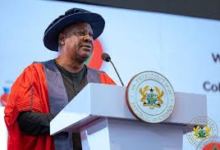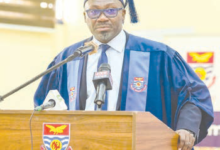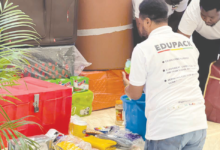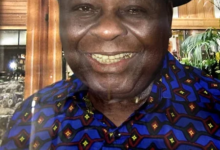Build robust local economy to salvage cedi depreciation – Prof. Mawuko-Yevuga

Professor Lord Mawuko-Yevugah, a Development and International Relations Analyst, has called on the government to build a robust local economy to salvage the current depreciation of the cedi.
According to him, this could be achieved by making sure that critical sectors of the economy were controlled by Ghanaians, while making sure that foreign investment is regulated to benefit the state.
This, he said, needed to be deliberate and systematic as was done in post-war Japan.
“For example, transnational companies (TNCs) should be welcome to invest in the Ghanaian economy, but their investment should not just serve their profit-making imperatives,” he said
He added that Ghana and other African states should negotiate with TNCs to transfer technology, to reinvest their profits in the domestic economy, rather than expatriating them, and to invest in, not just the upstream aspects of extractive industries, but also in mid-to-downstream activities.
Prof.Mawuko-Yevugah said this yesterday in a lecture dubbed, “COVID-19 Pandemic, Russia-Ukraine War and Ghana’s Economic Crisis.”
The lecture was organised by Think Progress Ghana (TPG) in collaboration with Graduate Students’ Association of Ghana (GRASAG), Ghana Institute of Management and Public Administration (GIMPA).
He said the impact of COVID-19 pandemic and Russia-Ukraine War events had been more significant in fragile and emerging economies, exposing the weak foundations of such economies on the one hand, and their vulnerabilities to the vicissitudes of the global economy on the other hand.
Prof.Mawuko-Yevugah said the Ghanaian economic crisis was undeniable as evidenced by a broad consensus among government officials, political and economic actors, scholars, the ordinary Ghanaian and indeed, the country’s international development partners, including the Bretton Woods Institutions: IMF and the World Bank.
“The crisis is manifested in rising inflation, rising budget deficits, ballooning and unsustainable debts levels, precipitous depreciation and fall in the value of the local currency (the cedi) relative to the major foreign currencies,” he said.
Prof.Mawuko-Yevugah said managing and surmounting Ghana’s perennial economic crisis required more than short-term artificial macro-economic fixes.
He said it required complete overhaul and restructuring of the economy, making it less dependent on global markets and the benevolence of others.
Prof.Mawuko-Yevugah advised stakeholders in revenue to check, loopholes in revenue mobilisation, by closing it and tough tax collection regime established to ensure maximum local revenue mobilisation.
“Expenditure controls are required including a stringent public financial management system and reviewing the public or political incentive system,” he said
He stated that cost saving measures including removal of perks and other burdens on the public purse would keep expenditures in check, and in saving money to fund development infrastructure.
“Immediate (short-term) as well as long-term measures are required in dealing with the current and future crisis in the economy,” he said
Professor Anthony Sallar, Executive Director, Think Progress Ghana said the aim of the think-tank policy was to bridge the gap between intellectuals, researchers, politicians and policymakers.
He said TPG relied on the experience and expertise of renowned scholars from diverse disciplinary and professional backgrounds to provide fit-for-purpose solution to challenges in economic, social, cultural, political, and health issues.
BY AGNES OPOKU SARPONG






